

Course search. Environmental Health and Sustainability. All Presentations. Feel blue? Touch green! Participation in forest/woodland management as a treatment for depression. Recent research by a team from Deakin University explored the health and wellbeing benefits of civic environmentalism – voluntary communal actions undertaken to promote ecosystem sustainability, typified by membership of a ‘friends of parks’ group.
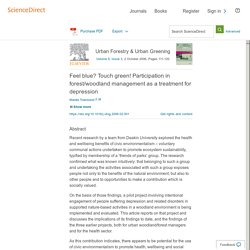
The research confirmed what was known intuitively: that belonging to such a group and undertaking the activities associated with such a group exposes people not only to the benefits of the natural environment, but also to other people and to opportunities to make a contribution which is socially valued. On the basis of those findings, a pilot project involving intentional engagement of people suffering depression and related disorders in supported nature-based activities in a woodland environment is being implemented and evaluated. This article reports on that project and discusses the implications of its findings to date, and the findings of the three earlier projects, both for urban woodland/forest managers and for the health sector.
Future - Have you ever felt ‘solastalgia’? Every few months, Oxford Dictionaries makes global headlines when it adds new words to its online vocabulary – the most recent updates include ‘hangry’ (anger resulting from hunger) and ‘manspreading’ (sitting with legs wide apart).

At the same time, researchers are coining new words that never quite make it into the popular lexicon – but perhaps they should. While you won’t find it in the Oxford English Dictionary, philosopher Glenn Albrecht once coined one such word while working at the University of Newcastle in Australia. 'Solastalgia’ – a portmanteau of the words ‘solace’ and ‘nostalgia’ – is used not just in academia but more widely, in clinical psychology and health policy in Australia, as well as by US researchers looking into the effects of wildfires in California.
It describes the feeling of distress associated with environmental change close to your home, explains Albrecht. Solastalgia is when your endemic sense of place is being violated – Glenn Albrecht, philosopher. Nature-Deficit Disorder. EcoHealth Action Over Lifetimes: Unity of Spirit, Voice, and Deeds.
Sustainability and Health. Ecological Health: Society, Ecology and Health. The emergent sea of nature and religion : a study of faith-based responses to issues of environmental sustainability - DRO. The Changing World Religion Map - Sacred Places, Identities, Practices and. Stan Brunn labels himself a cosmopolitan Middle Westener after being raised in small towns and rural areas in a half-dozen states.

He taught previously at the University of Florida and Michigan State University. He joined the University of Kentucky department in 1980 as chair and served in that capacity from 1980-88. He was appointed by the Governor as State Geographer from 1988-1989. Finding a Unified Understanding of Nature. IUCN World Parks Congress. Incorporating Sustainability into Community-Based Healthcare Practice. Category Finalists - Australasian Campuses Towards Sustainability Australasian Campuses Towards Sustainability. Mysite. On 22 February 2021, the Climate and Health Alliance (CAHA) ran this event as part of the National Sustainable Living Festival to provide the opportunity to hear about the development of possible alternative scenarios for Australia in 2030 and discuss the steps to a healthy, regenerative and just future. 5 possible scenarios were showcased for Australia's future based on: no change, marginal change, maladaptive change, radical transformative change and lastly the preferred, integrated scenario, which is the future we choose.

CAHA's President and Board Chair is Health Nature Sustainability Research Group member Dr Rebecca Patrick. Welcome. The Health, Nature and Sustainability Research Group (HNS) - formerly known as the NiCHE Research Group - is located within the School of Health and Social Development at Deakin University.
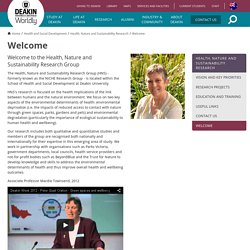
HNS's research is focused on the health implications of the link between humans and the natural environment. We focus on two key aspects of the environmental determinants of health: environmental deprivation (i.e. the impacts of reduced access to contact with nature through green spaces, parks, gardens and pets) and environmental degradation (particularly the importance of ecological sustainability to human health and wellbeing). Our research includes both qualitative and quantitative studies and members of the group are recognised both nationally and internationally for their expertise in this emerging area of study.
Associate Professor Mardie Townsend, 2012. HNSRG. Environments that Promote Mental Health and Wellbeing. Health and sustainability. Careers in health and sustainability You understand the environment and how it affects community health.
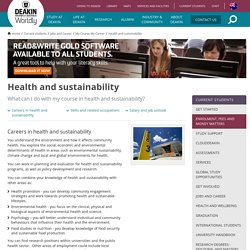
You explore the social, economic and environmental determinants of health in areas such as environmental sustainability, climate change and local and global environments for health. Environmental health. Contact with nature positively affects happiness and wellbeing. Spending time in nature influences our subjective wellbeing, which has long-term health and financial consequences.
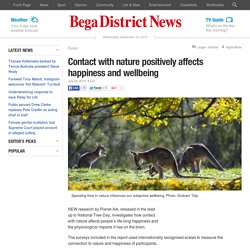
Spending time in nature influences our subjective wellbeing. Photo: Graham Tidy. NEW research by Planet Ark, released in the lead up to National Tree Day, investigates how contact with nature affects people’s life-long happiness and the physiological impacts it has on the brain. The surveys included in the report used internationally recognised scales to measure the connection to nature and happiness of participants. The report found that spending time in nature influences our subjective wellbeing, which has long-term health and financial consequences for Australians in light of our significantly reduced time in nature over the past generation. With today’s children spending more time inside and on screens than ever, we may be setting them up to become “the unhappy generation” Planet Ark said. The report, titled Needing Trees - The Nature of Happiness, found:
Architecture, Culture & Spirituality Forum. Does nature have restorative powers when it comes to health? How's the serenity?
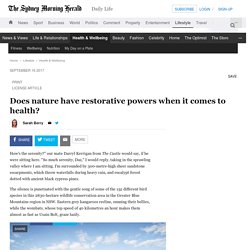
" our mate Darryl Kerrigan from The Castle would say, if he were sitting here. "So much serenity, Daz," I would reply, taking in the sprawling valley where I am sitting. I'm surrounded by 300-metre-high sheer sandstone escarpments, which throw waterfalls during heavy rain, and eucalypt forest dotted with ancient black cypress pines. The silence is punctuated with the gentle song of some of the 152 different bird species in this 2830-hectare wildlife conservation area in the Greater Blue Mountains region in NSW. Eastern grey kangaroos recline, sunning their bellies, while the wombats, whose top speed of 40 kilometres an hour makes them almost as fast as Usain Bolt, graze lazily.
It's often not until we pause that we realise how ragged our lives have become. Our body clock is powered by natural light, which resets our circadian rhythm each day, stimulating hormones that energise us during the day and help us settle into the night. Get that natural feeling. Planetary Health. Environmental Science academic books. Thinking Beyond the Rim. DOI:10.1093/acprof:oso/9780199773329.003.0011 This chapter completes our journey.
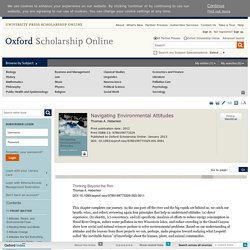
As the sun goes off the river and the big rapids are behind us, we catch our breath, relax, and reflect, reviewing again four principles that help us understand attitudes: (a) direct experience, (b) identity, (c) consistency, and (d) specificity. Analysis of efforts to reduce energy consumption in Hood River Oregon, reduce water pollution in two Wisconsin lakes, and reduce crowding in the Grand Canyon show how social and natural sciences partner to solve environmental problems. Based on our understanding of attitudes and the lessons from these projects we can, perhaps, make progress toward realizing what Leopold called “the inevitable fusion” of knowledge about the human, plant, and animal communities.
Lancet Medical Journal Manifesto for planetary health - Google Groupes. Initiative from the The Lancet.
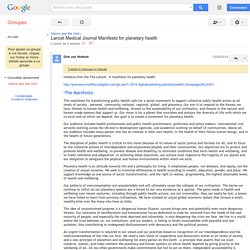
A manifesto for planetary health. "The Manifesto This manifesto for transforming public health calls for a social movement to support collective public health action at all levels of society - personal, community, national, regional, global, and planetary. Human Dimensions of Global Environmental Change: Research Pathways for the Next Decade. Overview Contents Resources Research. Making healthy places : designing and building for health, well-being, and ...: Deakin University Library Search. Environmental Health: From Global to Local.
The second edition of Environmental Health: From Global to Local, a comprehensive introductory text, offers an overview of the methodology and paradigms of this burgeoning field, ranging from ecology to epidemiology, from toxicology to environmental psychology, and from genetics to ethics. Expert contributors discuss the major issues in contemporary environmental health: air, water, food safety, occupational health, radiation, chemical and physical hazards, vector control, and injuries. Also emphasizing a wide variety of issues of global interest, the thoroughly revised second edition contains updated information on such timely topics as toxicology, exposure assessment, CEHAP handbook: Common Ground and Common Sense. Environment and Health - International Encyclopedia of the Social & Behavioral Sciences (Second Edition) Brian King The Pennsylvania State University, University Park, PA, USA Available online 17 February 2015 17 February 2015 Choose an option to locate/access this article: Check if you have access through your login credentials or your institution.
Health and the environment: a compilation of evidence. There is increasing awareness that our health and the environment in which we live are closely linked. This report compiles evidence on the relationship between health and a selected list of environmental factors including `natural' features (such as temperature and ultraviolet radiation) and aspects of our surroundings which have been created by humans (such as housing and transport). The results of this compilation highlight that: our surroundings can influence our physical health and mental wellbeing through a variety of channels; health and wellbeing may be affected in both positive and negative ways; humans, through their intervention in the environment, can play a vital role in exacerbating or reducing health risks. Climate change and global policy regimes. [electronic resource] : towards i...: Deakin University Library Search.
Environmental sociology. [electronic resource] : from analysis to action: Deakin University Library Search. Household sustainability : challenges and dilemmas in everyday life: Deakin University Library Search. Environmental health : indoor exposures, assessments and interventions: Deakin University Library Search. Climate Change and Society - Paperback - Riley E. Dunlap; Robert J. Brulle - Oxford University Press. Bookstore - Plan B 4.0: Mobilizing to Save Civilization. Health of People, Places and Planet - ANU Press - ANU. Reshaping Environments. [electronic resource] : An Interdisciplinary Approa...: Deakin University Library Search. The Oxford handbook of food history / edited by Jeffrey M. Pilcher.
Chs 15, 16, 26, 27. Good material. – jtlawson
Social causes of health and disease [electronic resource] / William C. Cockerham.
Ch 8 - social capital - topic 4. – jtlawson
Sustainable healthcare / Knut Schroeder ... [et al.] Global Health 101, Second Edition. World Sustainability Series (Titles in this series) B144 15 en. The Human–Nature Relationship and Its Impact on Health: A Critical Review. PowerPoints Public Health in the Anthropocene. Does living by the coast improve health and wellbeing? Walking for well-being: are group walks in certain types of natural environments better for well-being than group walks in urban environments? Environmental Science" Upstream or downstream? Hot or not: what's packing the uni lecture theatres. Glancing at a grassy green roof significantly boosts concentration. Green spaces deliver lasting mental health benefits.
Health benefits of urban vegetation and green space: Research roundup. Environmental Health Tag: Archive (ABC Science) Environment Archives. Thelancet. Above the Fold. Environmental Health News: Front Page. Just What the Doctor Ordered: Using Parks to Improve Children’s Health. Club of Rome′s new book reads like an eco manifesto. Club of Rome. Prescribing nature for improved health makes an economic case for the Land and Water Conservation Fund. How nature can help people experiencing loneliness. Deakin Explore. Climate change campaigner. Deakin Explore. Deakin Explore. The Australia Institute. Victorian Memorandum for Health and Nature. Think globally, act locally - the Maxim of René DubosSciHi Blog. Sustainability in Healthcare - health.vic.
Sundsvall Statement on Supportive Environments for Health. Environmental hazards. Policies and Position Statements - Public Health Association of Australia Inc. Baraka - a nonverbal film by Ron Fricke. The Planet. Topics » Thought Maybe. Happy Planet Index. Climate Change Health Check 2020. This Is Your Brain on Nature. The National Benefits Hub: Benefits of Recreation (Formerly the Benefits Catalogue)
Environmental Research Foundation. Nature, Economy, Society, Wellbeing. Facts on Health and the Environment. The Amoeba of Cultural Change. AtKisson Group – Keynotes & Presentations. The Global Warming Survival Guide. The Natural Edge Project: Meet The Teams - Secretariat. Google Street View Hyperlapse. Love Thy Nature Film - A Strong Case to Reconnect with Nature - VIDEO. List of environmental issues - Wikipedia. Index of sustainability articles - Wikipedia. Environmental Health Topics. About DMOZ.